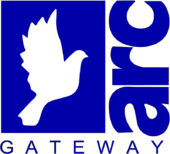ARC Gateway
| ARC Gateway | |
| Established | 1954 (incorporated August 24, 1972[1]) |
| Location | 3932 North 10th Avenue |
| Executive director | Donna Fassett |
| Board officers | Linda Bloom, president Peter Mougey, vice president Kathy Anthony, treasurer Jacquie Wallace, secretary |
| Website | arc-gateway.org |
ARC Gateway, Inc. is a non-profit organization that serves children who have or are at risk of developmental disabilities as well as adults with developmental disabilities.
ARC (usually pronounced as three letters, not "arc") was initially an acronym for "Association of Retarded Citizens," but was deprecated as the phrase "mentally retarded" grew in disfavor and officially changed in 2002.[2]
Contents
History
ARC Gateway dates back to 1947, when a small group of local parents opened a one-room school house for their own developmentally disabled children. The parents drafted an organizational constitution in 1954, appointed Pearl Nelson their first president, and became members of the state and national Associations for Retarded Children.
Over time, the parents who began ARC developed new programs, including the Pollak Activity Center and the Pollak Rehabilitation Workshop, day programs that gave developmentally disabled adults opportunities to learn and work. Programs for children continued to expand as well. In 1974, ARC Gateway began the Infant Stimulation Program, and in 1977, the Pearl Nelson Center became the Pearl Nelson Preschool, serving children ages two to five. ARC's first group home, the Women's Residential Training Center, opened in 1978.
Services & facilities
ARC Gateway now serves more than 850 children and adults with programs ranging from early intervention services, pediatric therapy and child care to retirement programs for senior citizens. Day programs include self-help training, basic academic classes and work opportunities at ARC and throughout the community. Residential programs include six group homes in the community and support for individuals living in their own homes.
Board of Directors, 2008-09
- Linda Bloom, president
- Peter Mougey, vice president
- Kathy Anthony, treasurer
- Jacquie Wallace, secretary
- Monroe Watley, past president
- Betty Butler
- Bob Dandridge
- Carol Ford
- Jay Gallacher
- Jay Gazani
- Jim Hobbs
- Bob Kent
- Todd King
- Britt Landrum III
- Fawn Lewis, M.D.
- Robert McDaniel
- Lee Magaha
- Kenny Morgan
- Jean Nall
- Lori NeSmith
- Alan Nickelsen
- Cameron Smith
- Dedra Thompson
- Bobby Tronu
- Ellen Vinson
- Jerry Watson
- John Welch
- Joyce Young
- Patricia Young
- Marie Young
- Dix Darby, honorary member
- L. B. Pollak, honorary member
External links & references
- www.arc-gateway.org – Official site
